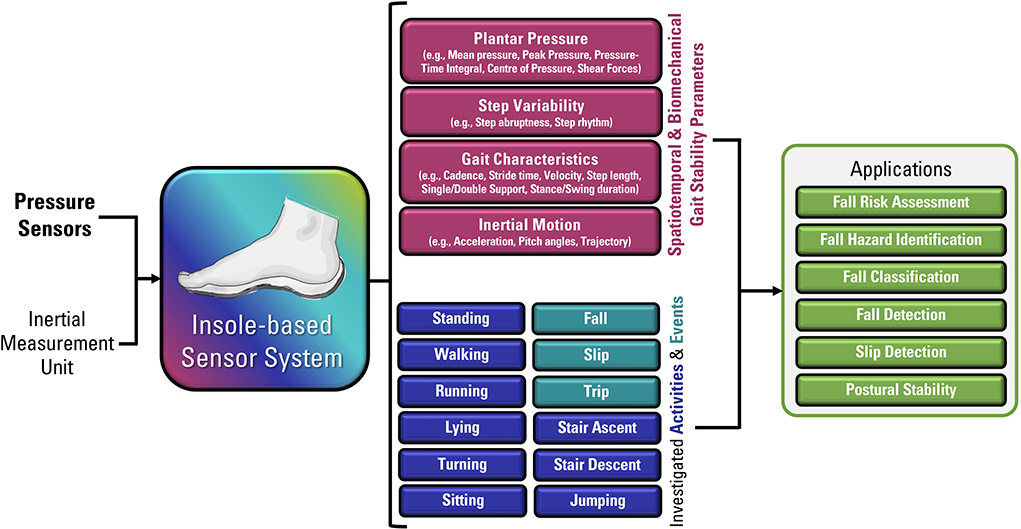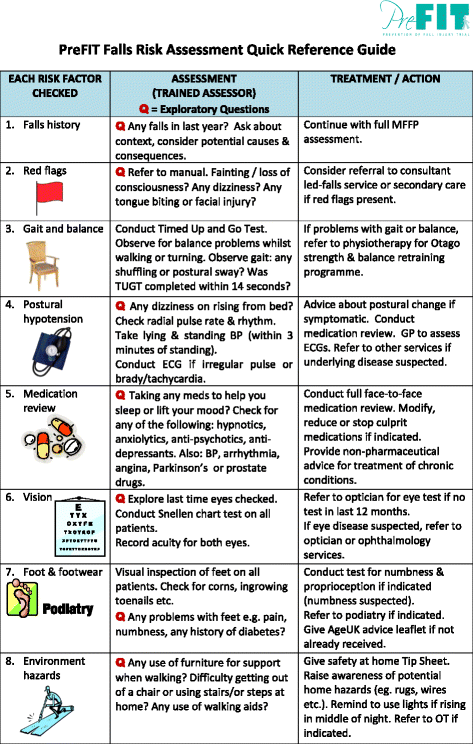Get This Report on Dementia Fall Risk
Get This Report on Dementia Fall Risk
Blog Article
Dementia Fall Risk Things To Know Before You Buy
Table of ContentsThe Dementia Fall Risk DiariesThings about Dementia Fall RiskFacts About Dementia Fall Risk UncoveredThe Greatest Guide To Dementia Fall RiskSome Known Details About Dementia Fall Risk
In the community, inadequate street lights or unsafe creeks and land fills may also trigger accidents. Autumns Threat Assessment Device (FRAT) is a 4-item falls-risk screening device for sub-acute and domestic treatment. The FRAT has 3 areas: drop danger condition, threat factor checklist, and action strategy. An Autumn Threat Condition consists of information about background of current drops, medicines, psychological and cognitive status of the individual.If the individual ratings on a risk aspect, the corresponding number of factors are counted to the person's fall danger rating in package to the much best. If a client's loss danger rating totals five or higher, the person goes to high danger for drops. If the client scores just four factors or reduced, they are still at some threat of falling, and the registered nurse should utilize their finest medical evaluation to take care of all autumn danger aspects as component of an all natural care strategy.
These standard methods, in basic, aid develop a risk-free setting that lowers accidental drops and delineates core preventative procedures for all patients. Signs are essential for people in jeopardy for drops. Health care service providers require to acknowledge that has the problem, for they are in charge of carrying out actions to advertise person safety and security and avoid falls.
Dementia Fall Risk Fundamentals Explained
As an example, wristbands need to include the individual's last and initial name, day of birth, and NHS number in the UK. Details must be printed/written in black versus a white history. Only red color should be made use of to signify unique individual status. These suggestions follow present growths in individual identification (Sevdalis et al., 2009).
Products that are also far may need the individual to connect or ambulate unnecessarily and can potentially be a threat or contribute to drops. Aids stop the patient from going out of bed without any kind of aid. Registered nurses reply to fallers' call lights faster than they do to lights launched by non-fallers.
Aesthetic impairment can greatly trigger falls. Hip pads, when put on correctly, might reduce a hip fracture when autumn takes place. Maintaining the beds closer to the floor decreases the danger of drops and major injury. Putting the mattress on the flooring substantially lowers loss threat in some medical care settings. Low beds are developed to go to my site minimize the distance a client drops after relocating out of bed.
Some Ideas on Dementia Fall Risk You Need To Know
Patients who are high and with weak leg muscles who attempt to remain on the bed from a standing position are most likely to fall onto the bed since it's too low for them to reduce themselves safely. If a high client efforts to obtain up from a reduced bed without support, the person is likely to fall back down onto the bed or miss the bed and fall onto the floor.
They're developed to promote prompt rescue, not to protect against falls from bed. Aside from bed alarm systems, raised guidance for high-risk patients also may help stop falls.

Clients with an evasion gait boost autumn possibilities drastically. To decrease loss risk, shoes need to be with a little look at this web-site to no heel, thin soles with slip-resistant step, and sustain the ankles.
Not known Details About Dementia Fall Risk
In a research, homes with adequate illumination report less falls (Ramulu et al., 2021). Enhancement in illumination at home might decrease loss rates in older adults.

Caretakers are effective for assuring a safe and secure, safeguarded, and safe setting. Nevertheless, studies showed very low-certainty evidence that sitters minimize autumn danger in severe care hospitals and only moderate-certainty that choices like video monitoring can decrease sitter use without increasing fall danger, recommending that caretakers are not as helpful as initially thought (Greely et al., 2020).
Some Ideas on Dementia Fall Risk You Should Know

Raised physical fitness lowers the risk for falls and restricts injury that is sustained when fall takes place. Land and water-based exercise programs might be similarly advantageous on balance and gait and consequently lower the threat for falls. Water exercise might contribute a favorable advantage on equilibrium and stride for females 65 years and older.
Chair Increase Exercise is an easy sit-to-stand read review workout that aids reinforce the muscular tissues in the thighs and buttocks and boosts flexibility and independence. The objective is to do Chair Surge exercises without utilizing hands as the customer comes to be stronger. See resources area for a thorough guideline on how to do Chair Surge workout.
Report this page